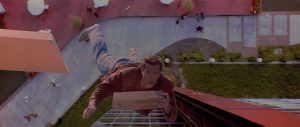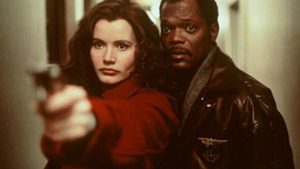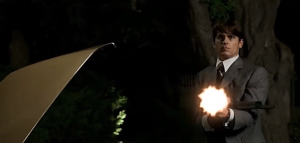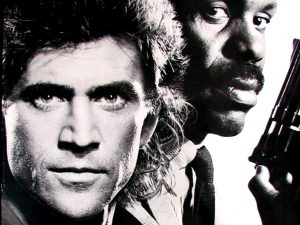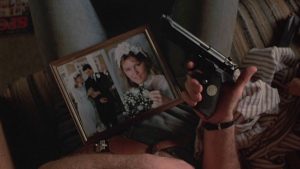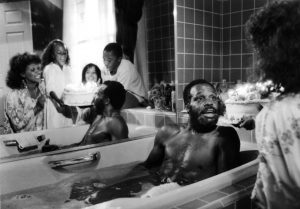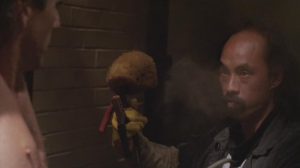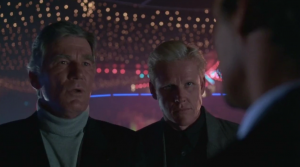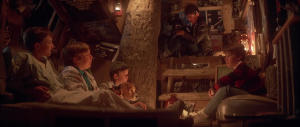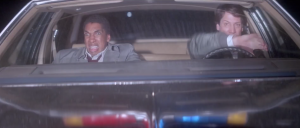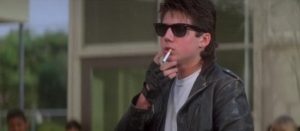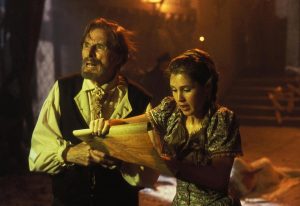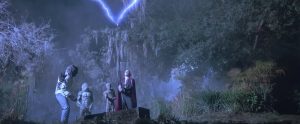OSS17-0913/0921FW102-1 – A Guide to the Films of Shane Black: Part 1
“There’s no more heroes left in the world.”
– General Peter McAllister, Lethal Weapon
“You can do this. Just do one thing right.”
– Mitch Hennessey, The Long Kiss Goodnight
Shane Black writes hard boiled LA noir. He writes trenchant, violent, convoluted detective stories suffused with an unobtrusive literacy and a vibrant mordant wit.
With smoke rings for halos and smirks across their fat lips, against all odds his damaged heroes haul each other to their feet and stagger on, bloodied but resolute, against a corrupt, vituperative world that holds integrity in smug contempt, a cynical world that declares honour vestigial.
Between 1986 and 1996, Hollywood repeatedly paid millions of dollars to this twentysomething scruff for the right to appropriate his stories and his characters and have safer hands soften them into “action comedies”. Following that, a decade of disillusion, substances, and seclusion from an industry grown jealous and jeering.
In 2005, a single perfect dispatch, a glorious false dawn. A full eight years later, the comeback proper – “Bang Bang” Black returned from Robert Downey’s address book to write and direct the fifth biggest film of all time.
Now, 2017, and we’re not sure what Hollywood will do, other than pony up and stand the fuck back.
Black has Demme’s dedication to supporting cast and the Coens’ commitment to character. His self-aware leads are romantics rendered run-down realists, exhausted by misfortune, reloading crouched behind walls of sardonic humour.
His villains and their plots are incidental, though never perfunctory, and serve mainly as a bomb-proof foundation to allow for the careful construction of the central pairing.
Black is preoccupied by bit-parts, his career devoted to a bestiary of memorable henchmen. And he’ll toss off that shot-calling sharp-suited mastermind at the top in two scenes, motherfuck a Hans Gruber, to foreground instead the certified sociopath of a right-hand man, the dark mirror of our hero, the sadistic bastard who’s in this for the thrill.
Black likes Christmas, the pause for introspection; in California, the absurdity of it, but the little slices of earnest charm, too. Black likes the stains of ambivalence, of a loving wife who cheats out of neglect, of a devoted mother who longs to cut and run.
Black writes of the resonance of trauma, the misery of loss, the pain of failure. How we numb that pain. How we overcome that pain. And yet we’re sat there dizzy, delighted, disarmed. How are his films so utterly enjoyable? Are we smiling through the tears or crying with laughter?
This is our guide to the films of Shane Black.
Lethal Weapon (Richard Donner, 1987)
written by Shane, re-written by Jeffrey Boam, produced by Joel Silver
Does the title begin with an L?
Unequivocally.
Is it set at Christmas?
The first sound in the first release in the career of Shane Black is Bobby Helms’ “Jingle Bell Rock” – you best believe it’s set at bloody Christmas.
Kidnap?
Yep!
Blackmail?
Yep!
Mismatched partners?
Black cop-white cop.
Murtaugh: sensible, risk-averse. Family man. Enjoys V-necks. Owns a sailboat with an engine (cautious). West Coast Bill Cosby without the cocktails.
Riggs: unstable, desperately depressed. Lonely. Domicile is a caravan literally on the beach. Martial arts expert, legendary sniper. Passes the time jumping off buildings, walking into gunfire, considering self-suicide by Beretta. Hilarity ensues!
Post-traumatic Shane disorder?
Riggs has been destroyed by the death of his wife in a car crash. The gripping scene in which he dares himself to eat a bullet is strong work by all involved. Mel Gibson is a deeply troubled alcoholic but it shouldn’t be forgotten that he has an undeniable talent for playing grieving nutters.
Fallen angel?
Literally. The film begins as, annihilated by drugs and sex, Amanda Hunsaker steps from a balcony, which I’d like to recut to Slade’s “Merry Xmas Everybody” with the doomed ingenue yelling “It’s Christmas!” all the way down.
Trash-talking teen?
Not here – high-schooler Rianne Murtaugh musta seen what her daddy did to Whoopi in The Color Purple and thought better of it.
Domestic bliss?
Rog has the whole bit – wife, kids, boat, and postponed plans for an addition to his fine family four-bed. Riggs has no pajamas, a busted TV and a framed picture of his dead wife, although at least nobody bloody bursts into the bathroom with birthday cake calling him old when he’s just trying to have a bath.
Convoluted conspiracy?
A blackmail plot by Green Berets running dope out of the Golden Triangle, inspired by a real-life black op of such dramatic fecundity that it’s been used a dozen times since, including a Mel Gibson film literally called Air America. Here, it feels like writing an adaptation of James Ellroy but then halfway into it throwing in Peralta and the Captain from Brooklyn Nine-Nine.
Scene-stealing henchman?
‘80s legend Al Leong as a torturer. “TELL ME WHERE THE HERSHEY’S BAR IS, MEL!”
Brilliant second-baddie?
A pre-accident Gary Busey as “Mr Joshua”, which rather suggests a deliriously gay upper class British puppet from Meet the Feebles but in execution is an Aryan throb of Reagan-era country club couture whose courteous speech and power bottom’s predilection for pleasure/pain rather suggests a deliriously gay upper class British puppet from Meet the Feebles.
And who’s actually the baddie?
Mitchell Ryan’s General McAllister, commander of Shadow Company (nomenclature cannibalised from the spec script that got Black noticed). It’s fun to pretend he’s Debbie’s dad from Grosse Pointe Blank. (“You musta done some naughty shit there, Bart!” “My people were loyal, Mr Blank, there were loyal to me.”)
They’ve read all the books and seen all the movies
More like a Joe Dante-style pop culture pick ‘n’ mix, with characters watching Bugs Bunny and the Alastair Sim version of A Christmas Carol and slapstick fan Riggs hiring a hooker to watch The Three Stooges with him.
None more Black I
Murtaugh: What do you do, sleep with that thing under your pillow?
Riggs: I would if I slept.
None more Black II
“No way you live. No way.”
The Monster Squad (Fred Dekker, 1987)
written by Shane and Fred
Black & Dekker’s first collaboration eschews many of Shane’s superficial tropes but retains the guts of what makes his screenplays shine – authentic relationships, bracing violence, misfit underdog protagonists and a whole heap of heart. A tribute to classic horror, bursting with ideas and executed with perhaps a greater sincerity than the contemporary Amblin style, it stands as a joyful counterpoint to this century’s numerous humourless “gritty” reboots, and bodes very well indeed for the old friends’ reunion on forthcoming creature feature The Predator.
Does the title begin with an L?
No, but M’s close. M, for MONSTER!
Mismatched partners?
Black cop-white cop
In supporting roles, the affectionate back-and-forth of partners Stan Shaw and Stephen Macht, who by the way must be Jonny Bernthal’s dad, plays like a smalltown Riggs and Murtaugh.
Post-traumatic Shane disorder?
In what is a gleeful teen-oriented monster mash, pathos king Black still finds a way to address the fucking Shoah. (Spoiler alert: he pulls it off.)
Fallen angel?
Dracula’s brides, latterly three schoolgirls. There’s also chaste older sister Lisa’s climactic comic fall from grace: “Well, there was Steve… but he doesn’t count!”
Trash-talking teen?
A half dozen of ‘em, the titular team (“‘Squad’? It’s like Miami Vice, I think”), who banter and blaspheme bolder than the Goonies. Chief among them, insouciant middle-school greaser, peeping Tom and bully-bullier Rudy Halloran, who Luke and I are rather hoping would like to be in our goddamn club.
Domestic bliss?
In between the supernatural hi-jinks are grounding glimpses of marital discord, a welcome holdover from (no surprise) Black’s earlier drafts. Sean’s parents are back in counselling and shortly before the denouement, his mother, despairing at her cop husband’s dedication to “the job”, is shown with suitcases packed and ready to take the kids with her. (Incidentally, Mrs Crenshaw is assayed by, of course, professional ‘80s mom Mary Ellen Trainor, beloved of both Dick Donner and Joel Silver).
Convoluted conspiracy?
A centuries-old conflict between Dracula and Van Helsing reduced to a handy macguffin.
Scene-stealing henchmen?
The ersatz Universal monsters – a mummy, a knock-off Creature from the Black Lagoon, and a youthful (but still balding) Uncle Rico as a tragic werewolf.
Brilliant second-baddie?
Gentle giant Tom Noonan, later to feature in Last Action Hero, as an own-brand Frankenstein’s Monster, though he quickly sides with the goodies.
They’ve read all the books and seen all the movies
..a quote I cribbed from the inlay of my VHS copy! The kids are proper Fangoria freaks, walls hung with giallo posters and drawers lined with comics. Throwaway diegetic namedrops abound – I particularly like Sean’s t-shirt, “STEPHEN KING RULES”, and the in-universe “holiday” slasher parody, Groundhog Day 7 – but Black & Dekker also offer expert-level winks, like armadillos (!) in one of several nods to Tod Browning.
None more Black I
The unexpected wipe-cut to a plane in flight, and Daryl Anderson (had to look that one up) and David Proval as a pair of pilots straight out of Abbott & Costello.
None more Black II
Sapir: That’s it, Del. This case is too hard, man. Let’s be firemen instead.
Which is recycled from Lethal Weapon!
Murtaugh: Special forces tattoo, mercury switches. What the hell have we gotten into?
Riggs: Yep. I wonder if there’re any openings at the LA Fire Department.
Further reading: Next week, Luke and Fletcher duck and cover as Black blows up with Lethal Weapon 2, The Last Boy Scout and Last Action Hero.
Further listening: We discuss what’s Black, Blacker and Blackest in our tribute to Shane Black on this podcast.
